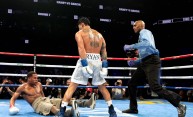While much of America mourns the fallibility of one of its biggest Sochi medal hopes, there are more than a few snowboarders who view Shaun White's failure to win a third straight Olympic gold as a positive for the sport.
White has become the face of the X Games-inspired sports that have reinvigorated the Winter Olympics since he won halfpipe gold as a teenager in Turin and retained his title in Vancouver four years later.
Loved by sponsors, broadcasters and the International Olympic Committee (IOC) for enabling them to tap into a younger demographic, White is a multi-million brand as well as one of the most gifted snowboarders of all time.
Tuesday's halfpipe final was supposed to mark his entry into the pantheon of Winter Olympic greats as the first from his young sport to win three golds in one individual event.
The sporting gods and Iouri "I-Pod" Podladtchikov had not read the script, though. White faltered to finish fourth while the swashbuckling Swiss nailed the run of a lifetime to saunter away with gold in the land of his birth.
White has said he aims to be back in South Korea in 2018 - "what else can I do?" - but his compatriot Danny Davis, for one, thought Tuesday's final was a timely reminder that snowboarding was not just about the one-time "flying tomato".
"I think it's good for snowboarding," said Davis, who fell twice to finish 10th. "The American public and the world now knows that there are other snowboarders beside Shaun White.
"I mean, Shaun is, don't get me wrong, one of the most talented, one of the best, riders there is. But there are guys who are just as good, if not better, and they deserve credit too."
Davis is part of a group of seven professional boarders known as FRENDS - "there's no 'I' in friends" - set up in 2009 to protect what they regarded as the sport's core values of friendship and having fun.
Although the collective now markets its own products, it is still regarded as something of a counter to the commercialism and arch-competitiveness represented by White.
That clash of philosophies was behind much of the criticism of White's decision to pull out of the Sochi slopestyle event due to fears he might injure himself and jeopardize his chances of the halfpipe "three-peat".
What in any other sport would have been regarded as a sensible decision was perceived by some boarders as an indication of White's win-at-all-costs attitude.
BATTLE FOR SOUL
The battle for the sport's soul goes back to before the Olympics in Nagano in 1998 when the man widely regarded as the best boarder in the world, Norwegian Terje Haakonsen, refused to take part.
"Snowboarding is about fresh tracks and carving powder and being yourself and not being judged by others," he said at the time. "It's not about nationalism and politics and big money."
The success of the sport at the Olympics - the debut of slopestyle was one of the highlights of the first days of the Sochi Games - suggests Haakonsen may have long lost that argument. But there are plenty who still worry about the future.
One thing that Tuesday's final did indicate is that, without White, the sport's Olympic future might not be an American or even a European one.
The failure of White, Davis and Greg Bretz to medal left the United States without a man on the podium for the first time in an Olympic halfpipe final.
The nine other finalists were three riders from the traditionally strong Swiss program, two Chinese, two Japanese, an Australian and a Slovenian.
The silver and bronze went to Japan's 15-year-old Ayumu Hirano, who became the youngest Olympic medalist in a snow event, and his 18-year-old compatriot Taku Hiraoka.
There remains a good chance, however, that a 31-year-old White will be twirling in the air high above the Olympic halfpipe in 2018.
"I move on from here and I don't think it makes or breaks my career, this one night, but definitely it's a disappointment," he told NBC.
When asked if he would be in Pyeongchang in four years' time, White replied: "I think so."
© Thomson Reuters. All Rights Reserved

